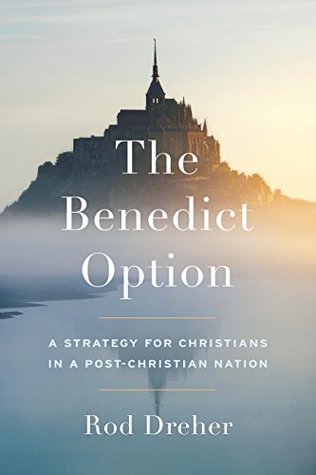More on this book
Community
Kindle Notes & Highlights
by
Rod Dreher
Started reading
September 11, 2018
Pope Emeritus Benedict XVI foretells a world in which the church will live in small circles of committed believers who live the faith intensely, and who will have to be somewhat cut off from mainstream society for the sake of holding on to the truth.
We tell ourselves that these developments have been imposed by a liberal elite, because we find the truth intolerable: The American people, either actively or passively, approve.
Rather than wasting energy and resources fighting unwinnable political battles, we should instead work on building communities, institutions, and networks of resistance that can outwit, outlast, and eventually overcome the occupation.
Rather than panicking or remaining complacent, they recognize that the new order is not a problem to be solved but a reality to be lived with. It will be those who learn how to endure with faith and creativity, to deepen their own prayer lives and adopting practices, focusing on families and communities instead of on partisan politics, and building churches, schools, and other institutions within which the orthodox Christian faith can survive and prosper through the flood.
If we are going to be for the world as Christ meant for us to be, we are going to have to spend more time away from the world, in deep prayer and substantial spiritual training—just as Jesus retreated to the desert to pray before ministering to the people.
No Reformer believed in private interpretation of Scripture, but they had no clear way to discern whose interpretation was the correct one. The Reformers quickly discovered that casting off Rome’s authority solved one problem but created another.
You can achieve the peace and order you seek only by making a place within your heart and within your daily life for the grace of God to take root. Divine grace is freely given, but God will not force us to receive it. It takes constant effort on our part to get out of God’s way and let His grace heal us and change us. To this end, what we think does not matter as much
as what we do—and how faithfully we do it.
If we don’t have internal order, we will be controlled by our human passions
In other words, ordering one’s actions is really about training one’s heart to love and to desire the right things, the things that are real, without having to think about it. It is acquiring virtue as a habit.
More broadly, prayer is maintaining an unfailing awareness of the divine presence and doing all things with Him in mind. In the Benedictine life, regular prayer is at the center of the community’s existence.
This is in opposition to the active life, which is to do good works in the world.
4). It is important to do things for the Lord, but it is more important to know him with your heart and your
mind. And that is why contemplation takes priority.
For the monks, prayer is not simply words they speak. Each monk spends several hours daily doing lectio divina, a Benedictine method of Scripture study that involves reading a Scripture passage, meditating on it, praying about it,
and finally contemplating its meaning for the soul.
When one advances in prayer, said Father Basil, one comes to understand that prayer is not so much about asking God for things as about simply being in His presence.
After I was spiritually healed, my priest explained his reasoning for directing me to give myself over to that simple meditative prayer: “I had to get you out of your head.” He meant that I was captive to an intellectual tendency to try to think my way out of my troubles—a strategy that always ended in failure for me. What I really needed to do was to quiet my mind and still my heart to open it to God’s grace. He was right.
If we are to live rightly ordered Christian lives, then prayer must be the basis of everything we do.
Good work is a fruit of a healthy prayer life.
Some of us define ourselves by our work and devote ourselves to it immoderately, at the expense of contemplation. Others, though, see work as something we do to pay the bills, nothing more, regarding it as disconnected from the rest of life, especially our spiritual lives. That’s a mistake, says the Rule. The work must serve not ourselves but God and God alone.


